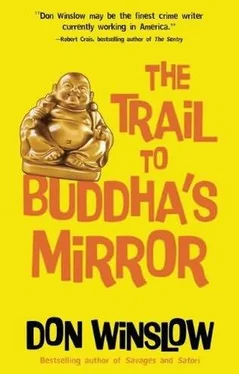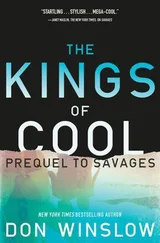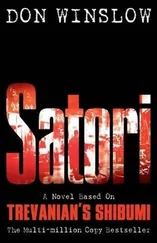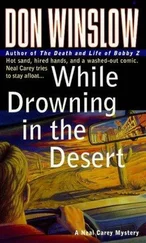Don Winslow - The Trail to Buddha_s Mirror
Здесь есть возможность читать онлайн «Don Winslow - The Trail to Buddha_s Mirror» весь текст электронной книги совершенно бесплатно (целиком полную версию без сокращений). В некоторых случаях можно слушать аудио, скачать через торрент в формате fb2 и присутствует краткое содержание. Жанр: Триллер, на английском языке. Описание произведения, (предисловие) а так же отзывы посетителей доступны на портале библиотеки ЛибКат.
- Название:The Trail to Buddha_s Mirror
- Автор:
- Жанр:
- Год:неизвестен
- ISBN:нет данных
- Рейтинг книги:3 / 5. Голосов: 1
-
Избранное:Добавить в избранное
- Отзывы:
-
Ваша оценка:
- 60
- 1
- 2
- 3
- 4
- 5
The Trail to Buddha_s Mirror: краткое содержание, описание и аннотация
Предлагаем к чтению аннотацию, описание, краткое содержание или предисловие (зависит от того, что написал сам автор книги «The Trail to Buddha_s Mirror»). Если вы не нашли необходимую информацию о книге — напишите в комментариях, мы постараемся отыскать её.
The Trail to Buddha_s Mirror — читать онлайн бесплатно полную книгу (весь текст) целиком
Ниже представлен текст книги, разбитый по страницам. Система сохранения места последней прочитанной страницы, позволяет с удобством читать онлайн бесплатно книгу «The Trail to Buddha_s Mirror», без необходимости каждый раз заново искать на чём Вы остановились. Поставьте закладку, и сможете в любой момент перейти на страницу, на которой закончили чтение.
Интервал:
Закладка:
“I didn’t think you had that many hotel rooms.”
“Oolong tea is exported all over the world,” Wu said.
The landscape was dotted with oval ponds about the size of large swimming pools.
“Fishponds,” Wu said. “An excellent source of protein.”
“No space can be wasted,” Peng elaborated.
This is certainly true, thought Neal. As far as he could see, every bit of ground was being used in some way. Most of the flat land was flooded for rice cultivation, and the hills were terraced to the very tops. Every hollow seemed to hold a fishpond, and vegetable patches clung to the ground in between.
“China has four times the population of the United States, but only one-third the arable land,” Wu said. “Much of China is desert or mountain. So we must make the best use of all the arable land. Sichuan Province is often called the Rice Bowl of China, because it is a fertile plain surrounded by high mountains. You are now in the middle of the Rice Bowl.”
“It’s beautiful,” Neal said, addressing himself specifically to Wu.
“Yes, it is,” Wu answered happily.
It was so beautiful that Neal forgot his skirmishing with Peng for a while and just took in the scenery. He hadn’t seen such open spaces since his days on the Yorkshire moor, days that seemed like a distant memory now. And while the moor was vast and lonely, the Sichuan Plain was vast and peopled. It wasn’t crowded, but it was definitely occupied. Lines of people moved slowly across rice paddies, children led buffalo along dikes, men in wide straw hats pushed wheelbarrows on narrow dirt roads. Old women, their heads wrapped in black turbans, sat beside the vegetable patches and smoked long-stemmed pipes as they scolded birds away. Younger women, often with babies slung on their backs, stacked piles of rice husks along the roadside. Just as every bit of land was used, thought Neal, every person on it was useful.
And where the moor was brown, southwest China was green. The paddies were green, the vegetable gardens were green, the hills of tea on the horizon were green. Here and there a metal rooftop shone silver, or a pond sparkled in blue, but they were like buttons on a gigantic emerald cloak.
“The rice in this area,” Wu said, “produces two crops a year, so the peasants are always busy planting, harvesting, or tending their fields. Two crops a year is wonderful! If we could ever find a way to grow three, there would be no growling stomachs in China ever!”
He laughed at what seemed to be an old joke.
“Three crops,” Peng muttered. “A typical Sichuanese dream. We do not need more harvests, we need more factories.”
After a couple of hours they came to a sharp bend in the road where a small teahouse and a few shacks were clustered.
“Do you need to use the toilet?” Wu asked Neal.
“Wouldn’t mind.”
Wu led him around the back of the teahouse. A bamboo fence screened the lavatory from view. The toilet was an open trench about three feet deep, graded so that the urine ran down a slope but the feces remained. Neal discovered the physics of the operation as he relieved himself of the morning’s coffee and Wu squatted down to do something more serious.
“What do they do?” Neal asked. “Burn it off every day?”
“Oh, no. The shit is valuable fertilizer. The night-soil removers come with buckets and carry it into the fields.”
“Is there a lot of competition for that job?”
“It is assigned by class.” Wu’s voice dropped to a whisper. “Very often, intellectuals or their families who were exiled from the city perform this job. My father was a night-soil remover after he was freed from prison.”
“Is it a punishment?”
“Not really. It is just that city people do not know the skills of farming, and this is something simple they can do. It is very hard work, though.”
So, after a few thousand years of taking shit from the gentry, Neal thought, the peasants are giving it back, literally.
“We cannot waste anything in China,” Wu said. “What do you do with shit in America?”
“Send it to Washington.”
“That is a joke.”
“You’re telling me.”
Wu stood up pulled his trousers up. “Yet you purged President Nixon and sent him to the countryside.”
“I don’t think he’s lugging around buckets of night soil, although it’s an appealing image.”
“President Nixon is a very great man. You should rehabilitate him.”
The stuff you hear in men’s rooms.
“Perhaps if he corrects his thinking,” Neal answered. “Does Peng ever have to piss, or is he really a robot?”
“You should not fight with Mr. Peng. He is an important man.”
“That’s why I’m fighting with him, Xiao Wu.”
“I do not understand.”
Neither do I, Wu, but I’m beginning to.
“Dwaizhou Production Brigade Central Committee Headquarters,” Wu translated from the signpost at the road junction.
Neal didn’t see anything that looked remotely like a Production Brigade Central Committee Headquarters, just a long, straight dirt road that stretched through rice paddies and wheatfields and disappeared into some low hills on the horizon.
They drove down the road for about three miles before coming to an S-curve among a copse of trees. On the other side, the road dropped into a valley in which Neal could see several villages, a dozen concrete grain silos, and a group of larger buildings that resembled a town center: the Production Brigade Central Committee Headquarters.
The car pulled into a parking lot in front of the largest building. A greeting committee of sorts had formed, and met Neal with broad smiles and an array of bows as he stepped out of the car.
“Mr. Frazier, please meet Mr. Zhu,” Wu said.
“Welcome, welcome,” said Zhu.
“Thank you very much,” Neal answered. “Xie xie ni.”
Zhu smiled at Neal’s attempted Chinese, took him lightly by the wrist, and repeated, “Welcome, welcome.”
Let the games begin, Neal thought as he looked around at his new surroundings. The building in front of him was a concrete and brick structure, three stories tall, with a broad set of concrete steps and a front landing. To the left, about a hundred feet away, was a single-story brick building that looked like a dining hall. To his left, surrounded by a cement patio with several wrought-iron, umbrella-shaded tables, was a swimming pool.
“Does Mr. Zhu speak English?” Neal asked Wu.
“Only ‘welcome, welcome.’”
“Why is he holding my wrist?”
“He likes you. It is a traditional greeting in this part of the country.”
“Who is he?”
“The Production Brigade leader.”
“He looks too young.”
“Everyone calls him ‘Old Zhu.’”
Old Zhu led Neal over to the patio, reached into a barrel, and came out with a bamboo fishing pole, which he handed to Neal. He pointed to the swimming pool, which Neal then saw wasn’t a swimming pool at all, but a fishpond. A closer look revealed that it was crammed with carp; the whole bottom of the pond looked like it was moving.
Zhu took a pole of his own, fixed a large breadcrumb on the hook, and cast it into the middle of the pond. A carp hit it right away. Zhu dragged in the fish, unhooked it, and handed it to a young man who was standing by for just that purpose. The boy ran to the dining hall with the fish. Zhu gestured for Neal to do the same, and by the time Neal had baited his hook, Wu and Peng already had their lines in the water and were waiting intently for the carp to strike. Neal thought of asking for a rifle, so that it would be exactly like shooting fish in a barrel, but didn’t want to hurt Zhu’s feelings. So he dropped his hook in and watched it land on a carp’s head. The fish tapped at the bait with no great enthusiasm, and Neal watched Wu, whooping with delight, haul in his catch. Peng caught one too, and broke his wooden demeanor with a triumphant yell as the boy came running back from the dining hall to collect the catch of the day.
Читать дальшеИнтервал:
Закладка:
Похожие книги на «The Trail to Buddha_s Mirror»
Представляем Вашему вниманию похожие книги на «The Trail to Buddha_s Mirror» списком для выбора. Мы отобрали схожую по названию и смыслу литературу в надежде предоставить читателям больше вариантов отыскать новые, интересные, ещё непрочитанные произведения.
Обсуждение, отзывы о книге «The Trail to Buddha_s Mirror» и просто собственные мнения читателей. Оставьте ваши комментарии, напишите, что Вы думаете о произведении, его смысле или главных героях. Укажите что конкретно понравилось, а что нет, и почему Вы так считаете.












